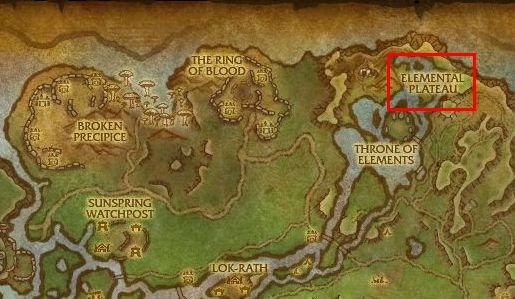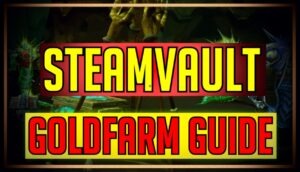Rogue’s favourite gold farm spots on BC Classic
Gold is necessary to play the game regardless of whether you are planning to invest yourself in PvE, PvP, or both. You may not be aiming for the 280% flying skill at a cost of 5000 gold, but since there is no dual-spec feature on Classic TBC (unlike WotLK), you may find yourself spending 50 gold on each respec, which can easily become 200 gold per week or more.
For this reason, farming gold may become an important part of your playtime.
Unlike mages or hunters, rogues generally avoid killing stuff to make their living. Rogues tend to make gold through:
– Gathering: farming items and mats that will be easily sold on the Auction House
– Professions: selling specific services and items or mats from your profession
Gathering
World of Warcraft wouldn’t be the same game if we had nothing to farm, right? The game relies on farming over and over to get something that will help you to farm another thing and so on.
A vigilant and perceptive rogue such as yourself will have a keen eye for fluctuations in demand and supply of various key materials throughout the content, such as:
Primal Elements
Everyone needs Primal Elements because they are part of many important crafts such as profession items, enchants etc. Selling them can be lucrative, but farming them might prove to be extremely competitive… The most expensive ones are usually Airs and Fires.
– Primal Fires: Elemental Plateau, Blade’s Edge, or Shadowmoon Valley are the spots for farming these.
– Primal Airs: Elemental Plateau is usually the place where you farm this element (closest to Shattrath) and it usually comes with a lot of PvP. Being a rogue gives you an advantage in the sense that you can probably choose when it’s worth fighting a player (or two) or flee. We’d recommend playing there with PvP gear and your Medallion of the Alliance/Horde. You can also find a spot for those Primal in Shadowmoon Valley.

On a side note, as a rogue, you are likely to be farming a lot of Primal Airs for agility enchants such as Cat’s swiftness (8) on Boots, Superior agility (2) on gloves, and eventually for Greater Agility (1) on the cloak. Also, many gear parts crafted through Leatherworking require Primal Airs, such as the Belt of Deep Shadows (10); we could mention plenty. Before selling those, you may farm quite a bunch of Airs for your own use (depending on your needs). Patience – after that, the money will come!
Scryers & Aldor Reputation items
– Scryers: Arcane tome and Sunfury signet
– Aldor: Fel armament and Mark of Sargeras
In the early stages of Classic TBC (ie. Launch until the end of S1), everyone will be grinding to earn exalted status with one of these two reputation factions. It follows that selling these items can be profitable… The best drop rate for these items comes from the elite demons (Aldor) and Blood Elves (Scryers) in dungeons. You can acquire those items by farming mobs in Netherstorm, Blade’s edge, and Shadowmoon Valley. Some spots may allow you to gather 150-200 gold per hour. Generally, Aldor items tend to be more expensive compared to Scryers. As a rogue, you have an advantage against felhunters in Netherstorm’s Arklon Ruins because they drain mana and spell lock (yikes!). Combine with skinning for-profits upon profits.
Some other reputation items are really easy to sell once you don’t need them anymore:
– Arakkoa feathers (Lower city)
– unidentified plant & Coilfang armaments (Cenarian Expedition)
But we don’t know yet how the economy will impact the prices of those mats.
Steamvault Dungeon in Coilfang Reservoir (Stealth Run)
If you’re pairing with another rogue, you can open all chests and share the loot with your partner. This usually allows making a lot of gold pretty fast by selling blue/green items. On fresh servers, these items are in high demand because good gear is scarce. You can easily do 5 runs per hour.
A rogue named Iverslina did a short video to explain the Steamvault Chest Farm. It goes without saying that gold-per-hour will depend on your particular server’s economy and we cannot predict that, but it nevertheless seems like there is a big window for profit: especially if you do that early in the content.
Update (08/08/21): We’ve got a nice guide about that written by Boochaun: Steamvault Gold Farm for Rogue
Herbalism
It may not boost your performance in the same way Leatherworking/Enchanting/Jewelcrafting would do, but it will definitely make you rich. If you care more about making gold as opposed to min-maxing professions (and we don’t judge), herbalism is the way to go. Super Mana Potions are the lifeblood of any server. Dreaming Glory is the name of the game. Besides that, you can always farm herbs for niche consumables that are fairly expensive as well – for example, Flame Caps or Lotus of various types.
More articles to read
Professions
Engineering
Just like for primal farming, you should consider that we may be surrounded by mafias and bots to camp most of the farm spots 24/7. So you may start by mining to gather for engineering and then consider farming gas clouds and drop mining in favor of Leatherworking. Mote Extraction from gas clouds is a great way to make money since this farm is reserved for engineers with the Zapthrottle Mote Extractor. You can find these clouds in every area of Outland. (Zangarmarsh provides Water Motes, Nagrand for Air, Shadowmoon for Shadow, and finally Netherstorm for Mana)
Jewelcrafting
Crafting and selling gems has proven to be extremely rewarding as everyone needs them. We can predict the demand for yellow gems (related to Hit, but also Haste later on) and red ones (related to Attack Power, Agility, and Spell Power).
Alchemy
Transmutation cooldowns are almost always in demand, particularly because Primal Mights are used in many different (including BiS) crafts.
Fishing/Cooking
Fishing and Cooking are two secondary professions often easily overlooked for their money-making qualities. They provide a lot of useful PvE consumables sold at the Auction House. With all the hardcore raiders aspiring to have top parses on warcraftlogs.com, it goes without saying that their expenditure on consumables can be a profit for you.
Here are some interesting consumables to cook through fishing:
– Golden Darter: is the only way to craft Golden Fish Sticks as they have no equivalent through meat consumables. So you could probably sell those for a good price.
– Furious Crawdad: +30 stam (tanks)
– Icefin bluefish: +23 spell power (casters)
Also, fishing can provide you with Scrolls, providing another source of income. Scrolls of Agility in particular can go for quite a bit of gold.
Opting for two gathering professions?
The reverse strategy could also be to have two gathering professions and to sell your mats in the auction house since they will be extremely on demand due to the important amount of players that will have double crafting professions on their main character and directly buy their materials. That’s some advice that Zatar is giving to his audience in this video.
For more insights on this topic, we prepared a guide that will help you with choosing professions as a rogue on TBC.
Questing
Apart from the fact that questing after level 70 transforms all the experience gains into gold (which can be something to consider grinding as a fresh 70 rogue looking for gold and gear), there are interesting ways to make a bit more gold through quests.
Daily heroic quests
Around 25 gold per quest. In order to unlock the Heroic Mode of Outland dungeons, you must reach Revered reputation with its reputation:
– Cenarion Expedition (Zangarmarsh dungeons)
– Honor Hold Thrallmar (Hellfire Peninsula dungeons)
– Lower City (Auchindoun Dungeons)
– Sha’tar (Netherstorm Dungeons)
– Daily quests from QD (endgame)
There are nineteen daily quests on the Isle of Quel’danas. They reward by 5 gold to 12 gold approximately (and a lot of reputation). You can make around 150 gold by completing all of them.
Becoming an Auction House trader
Not a rogue-specific method of making gold per se, but worthy of a mention nonetheless. You will need a bank character loaded with a lot of Auction House addons. You need to do your homework in order to anticipate spikes in demand as well as keep an eye out for supply shortages you can capitalize on.
A community member named Rastignac accepted to help us dive a bit deeper on this topic:
On World Of Warcraft, there’s generally the Flipping, which consists of speculating on an increased re-sell value. Or just snipe low-cost offers (like 30% market price) and then re-sell them at 110% for example. This kind of trade mostly depends on the market’s trend, and if you sell gear, components, consumables, etc. This is some good old speculation. But again, it requires quite a lot of time to learn which items are going to be the most needed, and when. For example, if we talk about plants, for specific professions (alchemy), a player usually has a big quantity of Briarthon which directly impacts the market price and trend. And it happens quite fastly to see some other player buying them at 200% of their price because of that need.
The second way is the Price Fixing, which is another kind of speculation, but requires A-LOT-OF-TIME. Some quick wins to keep in mind:
– Briarthorn mandatory for ~ 70-115 alch
– Flask of mojo mandatory for JC
– Silver ore/bars is a bottleneck for BS
You know pretty much everything about gold farming as a rogue on Burning Crusade Classic. Nothing really creative right here but that’s actually what we, shadows, got.
If you want to add something to this list, let me know (@Sbkzor) on Discord. I never was a goldfarmer myself, so I am sure we can find other efficient goldfarm options and I would be very happy to update this article with your inputs.
More articles to read





